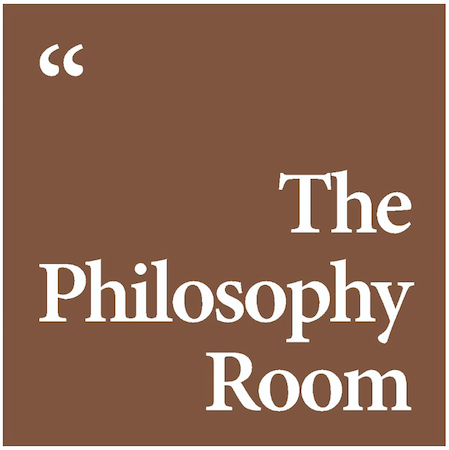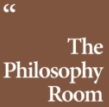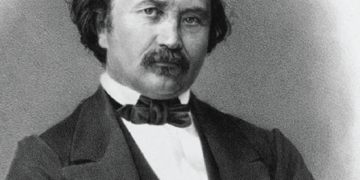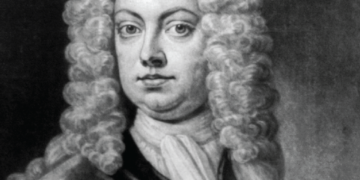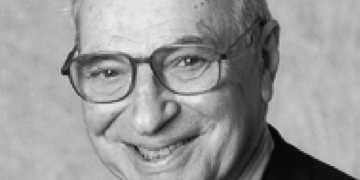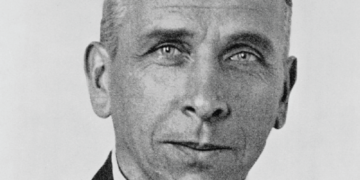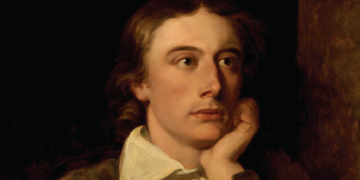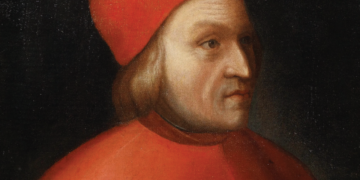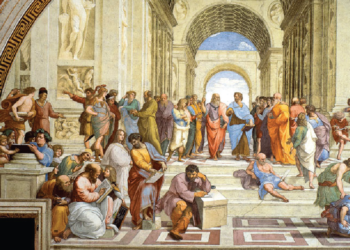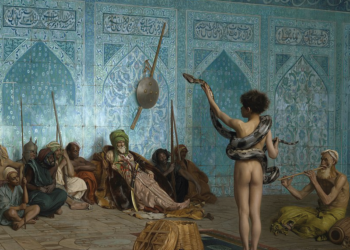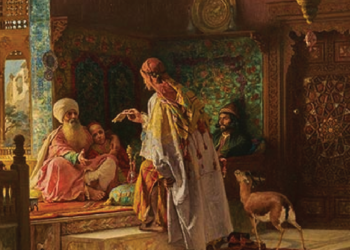Anne Hutchison
1) Her Biography
Anne Hutchinson was born Anne Marbury in July 1591 in Alford, Lincolnshire, England. The daughter of Francis Marbury, a clergyman and schoolteacher, Anne grew up in a household that valued education and religious study. Her father’s criticism of the Anglican Church likely influenced Anne’s later theological questioning. She received an unusually thorough education for a girl of her time, which allowed her to engage deeply with religious texts and ideas. In 1612, she married William Hutchinson, with whom she would eventually have more than a dozen children.
In 1634, Anne and her family emigrated to the Massachusetts Bay Colony, seeking religious freedom and attracted by the teachings of the Puritan minister John Cotton. Settling in Boston, she quickly became an influential figure within the community, holding weekly meetings in her home where she discussed sermons and promoted her own theological interpretations. Her popularity among both women and men alarmed colonial authorities, as her views challenged established religious and gender norms.
Hutchinson’s core belief, known as the “covenant of grace,” held that salvation was achieved through faith alone, not through good works or adherence to church laws. This theological position placed her at odds with many Puritan ministers, who emphasised a “covenant of works.” Her teachings sparked what became known as the Antinomian Controversy, a fierce theological and political struggle within the colony. The controversy divided the community and posed a threat to the unity the Puritan leadership sought to maintain.
In 1637, Hutchinson was tried before the General Court of Massachusetts for heresy and sedition. The trial was marked by a hostile tone, and her articulate self-defence, though impressive, was ultimately unsuccessful. She was convicted and subsequently excommunicated from the Puritan Church in a separate ecclesiastical trial. Her case highlighted the limited tolerance for dissent within the colony and the precarious position of women who dared to assert religious authority.
Following her expulsion, Hutchinson and her family relocated to Rhode Island, a colony founded by Roger Williams on principles of religious freedom. There she enjoyed greater liberty to express her beliefs and continued to attract followers. Her time in Rhode Island was relatively peaceful compared to the turmoil in Massachusetts, though her influence in broader colonial religious life remained considerable.
After the death of her husband in 1642, Hutchinson moved again, this time to an area near what is now Pelham Bay Park in the Bronx, seeking further isolation from colonial authorities. Tragically, in 1643, she and most of her children were killed in a violent attack by Siwanoy Native Americans, likely a result of escalating tensions between settlers and Indigenous groups. Some saw her death as divine judgement, but others viewed it as a tragic end to a life marked by courage and conviction.
Hutchinson’s legacy endured long after her death, particularly as an early advocate of religious freedom and female religious authority. In a society dominated by rigid orthodoxy and patriarchal control, she stood out as a figure of spiritual independence and moral resilience. Over time, her story has come to symbolise resistance against authoritarianism and the enduring struggle for individual conscience in the face of institutional power.
2) Main Works
The Examination of Mrs Anne Hutchinson (1637)
This is the most substantial source of Hutchinson’s recorded words. It is a transcript of her civil trial before the General Court of Massachusetts. In this document, she articulates her views on divine revelation, justification by grace, and the spiritual authority of believers. She defends her right to interpret scripture and express dissenting opinions. The examination reveals her theological depth, her rhetorical skill, and the intensity with which she challenged the Puritan leadership.
The Church Trial of Anne Hutchinson (1638)
Following her civil conviction, Hutchinson was also subjected to a church trial, which resulted in her formal excommunication. The transcript of this ecclesiastical hearing highlights the spiritual and doctrinal charges laid against her. Here, Hutchinson insists upon her right to receive divine inspiration and to share it with others, and she boldly critiques the ministers’ teachings. The document captures the tension between personal conscience and institutional orthodoxy.
The Antinomian Controversy, 1636–1638: A Documentary History (edited collection)
This modern compilation by historian David D. Hall includes letters, court documents, sermons, and other materials related to Hutchinson’s teachings and the broader conflict. Although not authored by Hutchinson, the volume presents a comprehensive view of the theological debates of the time and contains numerous references to her ideas. It contextualises her thought within the intellectual and spiritual life of early New England.
Notes from John Winthrop’s Journal (1630s)
John Winthrop, Governor of the Massachusetts Bay Colony, kept detailed journals documenting colonial affairs, including Hutchinson’s activities and trials. While his entries are critical of Hutchinson, they nevertheless provide a valuable account of her influence and the perceived threat she posed to Puritan authority. Through these notes, one can glean insights into how her beliefs were interpreted by contemporaries.
Witness Statements from the Trials
Various depositions and statements given by supporters and detractors during the trials offer indirect but important records of Hutchinson’s teachings. These include reports of what she said in her home meetings, as well as how her followers understood and propagated her views. They reflect the extent to which her message resonated with many colonists, especially women.
Letters and Testimonies of Her Followers
Some of her most devoted followers left letters or statements defending Hutchinson’s character and theology. Though not penned by Hutchinson herself, these writings help reconstruct her intellectual and spiritual stance. They emphasise her kindness, conviction, and deep knowledge of scripture, which made her both a spiritual guide and a social leader.
Modern Scholarly Interpretations and Reconstructions
Because Anne Hutchinson did not publish books or treatises, much of what we know about her comes through later scholarship. Modern historians and theologians have reconstructed her theological vision from scattered sources. These studies often portray her as a proto-feminist thinker and a forerunner of religious liberty in America.
3) Main Themes
Justification by Grace Alone
Central to Hutchinson’s theology was the belief in justification by grace rather than by works. She argued that salvation came through God’s grace alone, not through moral deeds or strict adherence to religious laws. This stance directly opposed many Puritan ministers who emphasised outward morality and church discipline as evidence of salvation. Hutchinson’s insistence on inner spiritual transformation marked a bold theological statement that aligned with the broader Protestant Reformation, yet challenged the religious establishment of her community.
Direct Revelation and Inner Light
Hutchinson maintained that true believers could receive personal revelations directly from God. She believed the Holy Spirit could speak inwardly to the elect, offering guidance that surpassed institutionalised religious teachings. This belief in the “inner light” undermined clerical authority and suggested that divine truth was accessible outside traditional church structures. It was this theme, particularly her claim to prophetic insight, that contributed to her eventual trial and banishment.
Critique of Clerical Authority
A recurring theme in Hutchinson’s teachings was her challenge to the spiritual and moral authority of the Puritan clergy. She accused many ministers of promoting a “covenant of works” and leading congregations away from true spiritual understanding. Her theological critique was deeply entwined with a social one, as she questioned the legitimacy of a male-dominated hierarchy that silenced alternative interpretations of scripture and faith.
Religious Freedom and Liberty of Conscience
Hutchinson’s trials brought to the forefront the tension between orthodoxy and liberty of conscience. Her insistence on the right to gather privately, interpret scripture, and speak openly about her beliefs highlighted the importance of religious self-determination. Though she did not use the language of “freedom of religion” in a modern sense, her actions and defence were early expressions of the idea that spiritual belief should not be constrained by the state or church.
Gender and Spiritual Authority
Another significant theme in Hutchinson’s life and thought was the role of women in religious discourse. By leading theological discussions and asserting her interpretations publicly, she transgressed the strict gender roles of Puritan society. While she did not argue for women’s rights explicitly, her actions challenged the notion that women were unfit for theological reasoning or public spiritual leadership. In doing so, she became an early symbol of female religious agency.
The Nature of the Elect
Hutchinson taught that only the truly “elect” could understand spiritual truths and that this election was known through an inner assurance, not outward conformity. Her ideas contributed to intense debates within the colony about who could be considered a true Christian. This theme resonated deeply with those who felt alienated by the increasingly rigid and performative nature of Puritan religious life, offering a more intimate and personal model of salvation.
Community Division and Religious Conflict
Lastly, her story embodies the theme of religious conflict within a supposedly unified community. The Antinomian Controversy, in which she was the central figure, exposed deep divisions within the Massachusetts Bay Colony. Hutchinson’s influence revealed that dissent was not just possible but widespread, challenging the myth of a uniformly devout and doctrinally consistent society. Her case demonstrated how religious differences could fracture social cohesion and lead to institutional backlash.
4) Hutchison as a Social Reformist
Anne Hutchinson’s role as a social reformist is most evident in the ways she challenged the deeply entrenched religious, political, and gender norms of 17th-century Puritan society. Though her reforms were not expressed through legislative action or political platforms, her defiance of the established order and her radical theological positions effectively questioned the foundations of New England’s theocratic governance. Her reformist impulse lay not only in what she taught but also in how she lived—asserting the right to spiritual self-determination in a world where such autonomy was rarely granted, especially to women.
One of Hutchinson’s most profound social interventions was her challenge to gendered expectations. By organising mixed-gender theological meetings in her home, she subverted traditional roles that confined women to domestic and silent religious participation. These meetings created an alternative intellectual space where ideas could be discussed freely and spiritual questions explored outside the authority of the male-led church. Her popularity among both women and men highlighted the appeal of these informal gatherings and signalled a deep public interest in more inclusive forms of religious engagement.
Hutchinson’s insistence on individual interpretation of scripture posed a significant challenge to the hierarchical structure of Puritan society. At a time when religious doctrine was tightly controlled by ordained ministers, her assertion that the Holy Spirit could directly enlighten any believer undermined clerical dominance. This democratic religious vision—where every individual could access divine truth without mediation—implicitly argued for a more egalitarian society in which authority derived not from office or gender, but from personal spiritual experience.
Her defiance also exposed the limits of religious tolerance in a colony that had itself fled persecution in England. By standing up to Governor John Winthrop and the General Court, Hutchinson revealed the contradictions of a system that claimed to pursue godliness and liberty while suppressing dissent and enforcing rigid orthodoxy. Her banishment sent a clear message to other colonists, yet it also sparked broader debates about the balance between communal order and personal conviction. In this way, she unintentionally laid the groundwork for later American ideals of religious freedom and pluralism.
Beyond the theological sphere, Hutchinson’s reformist stance also had broader implications for the social structure of the colony. Her actions inspired a group of followers—sometimes called “Antinomians”—who questioned not just religious doctrines, but the legitimacy of an elite ruling class that controlled both church and state. Though her movement was eventually quashed, it showed that alternative models of community and authority were conceivable, even in a rigidly structured environment like Puritan Massachusetts.
After her exile, Hutchinson continued to embody social reform through her resettlement efforts. Moving first to Rhode Island and then to the area now known as the Bronx, she sought places where people could live without fear of persecution. Rhode Island, in particular, became a refuge for those fleeing the religious strictures of the Massachusetts Bay Colony, and Hutchinson’s presence there helped shape its early character as a bastion of tolerance and independence.
In retrospect, Hutchinson’s social reformism lies in her capacity to provoke structural change simply through the force of her convictions and the integrity of her actions. She never framed herself as a revolutionary, yet her life represents a quiet rebellion against authoritarianism and exclusion. Her legacy endures as a reminder that lasting reform often begins with individual courage, intellectual honesty, and a refusal to accept injustice disguised as tradition.
5) Her Legacy
Anne Hutchinson’s legacy endures as one of the most compelling and complex in early American history, embodying themes of religious liberty, gender equality, and civil dissent. Though she lived in a time when women were expected to be silent within public and religious life, Hutchinson’s courage in articulating her beliefs made her a lasting symbol of resistance to authoritarianism and a forerunner of rights that would only be fully realised centuries later. Her story has been retold as one of moral defiance, intellectual strength, and spiritual conviction, securing her place among foundational figures in the development of American thought.
Perhaps the most profound element of her legacy lies in the role she played in shaping the idea of freedom of conscience. Hutchinson’s trials exposed the dangers of a state-enforced religious orthodoxy and demonstrated the need for a society in which individuals could follow their own spiritual convictions without fear of persecution. Her exile to Rhode Island, a colony known for its commitment to religious tolerance, positioned her among those who helped plant the seeds of American pluralism. Long before the First Amendment, Hutchinson embodied the principle that religious belief should be a matter of personal conscience, not institutional decree.
In the centuries following her death, Hutchinson has become an icon of early feminist thought, though she never framed her actions in explicitly feminist terms. Her decision to preach, to lead, and to speak publicly—especially in a theological context—was a bold rejection of the gender norms of her day. Historians and feminist scholars alike have reclaimed her story as an example of a woman asserting intellectual and spiritual authority in a patriarchal society. She has since been recognised as a trailblazer who challenged not only theological dogma but also the social order that marginalised women’s voices.
Hutchinson’s influence extends into modern civil discourse, where she is frequently cited in discussions of religious liberty and individual rights. Political leaders, educators, and activists have drawn inspiration from her story, interpreting it as a lesson in the importance of defending moral convictions even when doing so invites punishment or alienation. Her example continues to resonate in times and places where dissent is suppressed, and where voices—especially those of women—are silenced by dominant powers.
Monuments and memorials to Hutchinson have been erected across the United States, including a statue at the Massachusetts State House and a river and parkway named after her in New York. These commemorations mark a shift from her historical vilification to her celebration as a symbol of liberty. Educational institutions also include her in curricula exploring the roots of American democracy, dissent, and religious diversity, helping new generations to appreciate her contribution to the nation’s foundational ideals.
Her legacy also lives on through cultural depictions and reinterpretations. Novels, plays, essays, and historical biographies have portrayed Hutchinson not only as a religious dissenter but as a visionary figure whose ideas transcended the limitations of her time. These portrayals highlight her role as a thinker who imagined a more inclusive and spiritually free society, even if such a society was not fully within reach during her lifetime.
